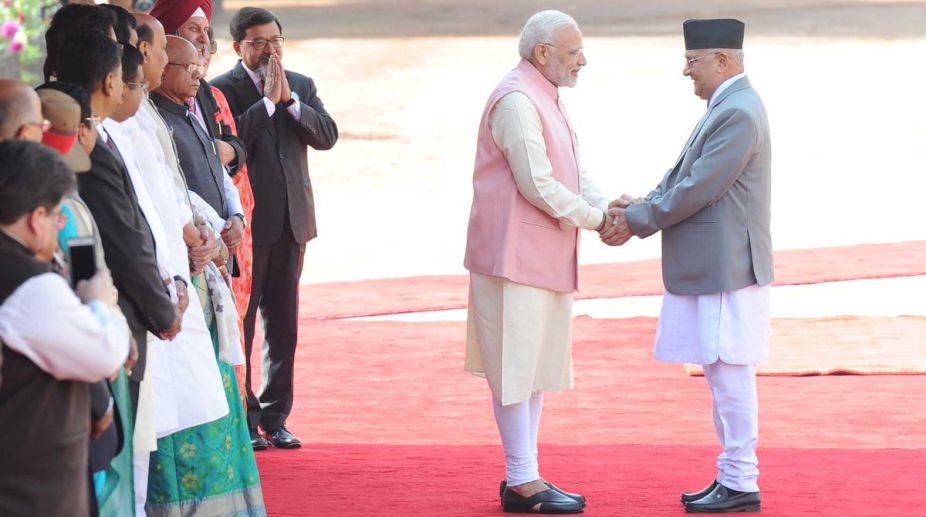PM lauds sanitation workers and police for efforts to keep Mahakumbh clean
He highlighted its grandeur, divinity, Sanatan heritage, cleanliness, and seamless public management, earning national and global praise.
The two countries agreed to construct a new electrified rail line with India’s financial support connecting Raxaul in India with Kathmandu to promote people-to-people linkages and economic growth.

Nepali PM KP Sharma Oli and Indian PM Narendra Modi.(Photo: PIB)
Prime Minister Narendra Modi and his Nepalese counterpart K P Sharma Oli on Saturday sought to put behind them the acrimony witnessed in ties between their two nations in 2015-16 by announcing game-changing joint initiatives in key areas like rail connectivity, agriculture, waterways and security.
The two countries agreed to construct a new electrified rail line with India’s financial support connecting Raxaul in India with Kathmandu to promote people-to-people linkages and economic growth.
Advertisement
This assumes significance against the backdrop of moves by China to set up a rail line between Lhasa in Tibet and Kathmandu. The two countries would carry out the survey work in one year and then finalise funding modalities.
Advertisement
They also agreed to develop inland waterways for the movement of cargo within the framework of trade and transit arrangements, providing additional access to the sea for Nepal. In the area of agriculture, the two countries announced their decision to promote cooperation in agricultural science and technology, agricultural production and agro-processing. India would also undertake a pilot project on organic farming and soil health monitoring for implementation in Nepal.
PM Modi pulled out all the stops to reach out to Oli as the two leaders discussed a series of steps to give a new direction to ties between their two nations. ‘’Let bygones be bygones was the common refrain at the meetings between the two sides at different levels,’’ an official quipped, in an obvious reference to the bitterness that marked Oli’s first term in office in 2015-16 when India imposed an economic blockade on Nepal, which forced the Nepalese leadership to strengthen links with China.
While no agreements were signed between the two sides, the two PMs inaugurated the Integrated Check Post at Birgunj in Nepal to enhance cross-border trade and transit of goods and movement of people. They also witnessed the ground-breaking ceremony of the Motihari-Amlekhgunj cross-border petroleum products pipeline at Motihari in India.
In his statement to the media, Modi assured Oli that India would stand with Nepal as a ‘reliable partner’ and appealed to the Nepalese leader to ensure that the open border between the two countries was not misused.
Oli, widely perceived as a pro-China leader, emphasised that relations between India and Nepal should be based on the principles of equality, justice and mutual respect. ‘’Prosperity is our common goal. We need support and cooperation of our friends. Nepal attaches great importance to its relations with India,’’ he said.
At a briefing later, Foreign Secretary Vijay Gokhale said the visit by Oli was ‘overall satisfactory’ for both the PMs who wanted to move forward in the relationship. In response to a question, he said PM Modi had accepted Oli’s invitation to visit Nepal later this year. The two countries have decided to address each other’s concerns relating to terrorism, drug trafficking and human trafficking.
Advertisement